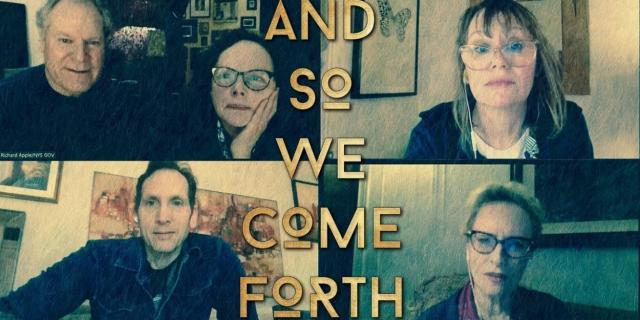
As the hiatus from live theater continues with no respite in sight until at least 2021, we draw what sustenance we can from Zoom plays, archival broadcasts, benefit readings, and Hamilton on Disney Plus. Richard Nelson’s fictional Apple family is experiencing a similar sense of depravation and loss. In And So We Come Forth, the second piece about the middle-class clan in Rhinebeck, NY, since the coronavirus lockdown began, the four adult Apple siblings plus one romantic partner, sit down to a remote dinner and commiserate over the devastating effects of the pandemic. Each expresses a sense of emptiness and futility. Though not much happens and there is a minimum of activities such as game playing or political discussion which propelled action in the previous plays, this hour-long rumination on our fractured state between quarantine and normalcy resonates with sorrow and empathy.
We first encountered the Apples with That Hopey, Changey Thing presented Off-Broadway at the Public Theater in 2010. Each of the plays in the series—the latter three are Sweet and Sad (2011), Sorry (2012), and Regular Singing (2013)—take place on a significant day in American politics. The family quarrels over public life and private travails in naturalistic dialogue in the Chekhovian manner. Nelson extended his Rhinebeck panorama to two other families with plays about the Gabriels (three) and the Michaels (one). All of them make us feel as if we are eavesdropping. Once the COVID-19 pandemic forced us all into isolation, Nelson regathered much of the original cast for a play performed on Zoom—What Do We Need to Talk About—in late April.
Now in early July, as New Yorkers are beginning to slowly emerge from the cocoon of quarantine, the Apples are facing fresh crises and turning points. Newly divorced Richard (Jay O. Sanders, a grieving teddy bear) is buying a new house and is struck by an anecdote concerning the life work of a late friend of a friend nearly being tossed in a dumpster by alienated offspring. Barbara (Maryann Plunkett subtly nursing sorrow and grudges) resents her former students for requesting that she stop contacting them. Marian (Laila Robbins quietly exposing loneliness) sadly recounts realizing in her bathtub that she has not touched another human being in three months and that the highlights of her days are sprinkling the neighbor children with a water hose and a flirtation with a man walking his dog by her house.
Jane (Sally Murphy skillfully combining anger and desperation) and her partner Tim (Stephen Kunken subtly displaying dismay and searching for solace) are struggling with cramped living quarters, a fussy canine, and the possibility of Tim’s teenage daughter and her displaced friend coming to live with them during the summer.
You could quarrel with the lack of plot and action. In the previous Zoom play, there was a lot of catching up to do and more direct social commentary. Here, the Apples ruminate and counsel each other, and not much else “happens.” The only real action is Richard and Barbara asking provocative, philosophical questions. The work is more like a short story than a play since there is so little forward movement. But Nelson’s understated direction and the nuanced performances reveal multiple layers of these people and make us want to stay for many more meals.
The title refers to the final lines in Dante’s “Inferno” as the characters emerge from hell into a new world. Hopefully, we will hear more from the Apples as they enter the post-pandemic era.
